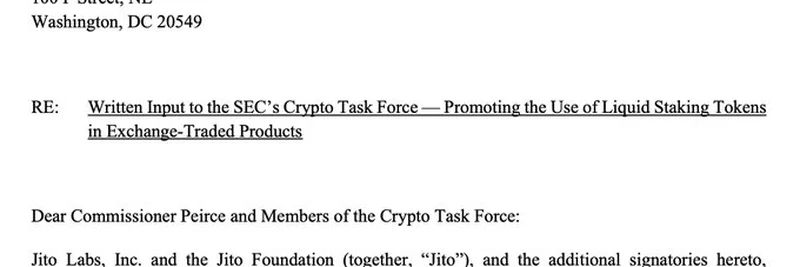Hey there, crypto enthusiasts! If you’ve been keeping an eye on the blockchain world, you’ve probably heard the buzz around Solana and its potential Exchange-Traded Products (ETPs). A recent tweet from SolanaFloor dropped a bombshell: Jito Labs, Bitwise Invest, Multicoin Capital, VanEck, and the Solana Institute have teamed up to urge the U.S. Securities and Exchange Commission (SEC) to approve Liquid Staking Tokens (LSTs) in Solana ETF applications. Let’s break this down and explore what it means for the future of crypto investing!
What’s the Big Deal with Liquid Staking Tokens?
First off, let’s talk about LSTs. Imagine you’re staking your Solana (SOL) to earn rewards, but instead of locking up your tokens, you get a special token in return that you can trade or use elsewhere. That’s essentially what a Liquid Staking Token is! It gives you flexibility while still letting you earn staking rewards. The group behind this push argues that LSTs bring capital efficiency, operational resilience, and better risk management to the table—qualities that align with recent SEC guidance on how crypto ETPs can be created and redeemed.
The Solana ETF Connection
This isn’t just a random suggestion—it’s tied to eight Solana ETF applications filed with the SEC, starting around June 13, 2025, with additional filings on June 25, 2025. These applications aim to bring Solana into the mainstream investment world through ETPs, which are like stocks you can trade on regular exchanges but backed by crypto assets. The letter, submitted via the SEC’s website, highlights how LSTs could supercharge these Solana ETPs by making staking more accessible and efficient.
Why Now?
The timing couldn’t be better. The SEC has recently greenlit in-kind creations and redemptions for crypto ETPs, a move that makes these products cheaper and more efficient for investors. This shift signals a growing acceptance of crypto in traditional finance, and Solana’s high-speed, low-cost blockchain is perfectly positioned to capitalize on it. By advocating for LSTs, these companies are pushing for a system where investors can enjoy the benefits of staking without the usual limitations.
Who’s Behind This Push?
The lineup is impressive: Jito Labs (a key player in Solana’s staking ecosystem), Bitwise Invest and VanEck (well-known asset managers), Multicoin Capital (a crypto venture firm), and the Solana Institute (a group promoting Solana’s adoption). Together, they’re making a strong case to the SEC’s Crypto Task Force, led by Commissioner Hester Peirce, who’s known for her pro-crypto stance. This collaborative effort shows how serious the industry is about integrating advanced DeFi (Decentralized Finance) features like liquid staking into regulated products.
What’s Next for Solana and Crypto Investors?
If the SEC approves LSTs for Solana ETPs, it could open the floodgates for more innovative crypto products. Investors might see lower costs, better returns, and easier access to Solana’s ecosystem—all while staying within the safety net of regulated markets. For blockchain practitioners, this is a chance to dive deeper into how DeFi tools like LSTs can bridge the gap between crypto and traditional finance.
Keep an eye on meme-insider.com for more updates on this story and other exciting developments in the meme token and blockchain space. What do you think—will LSTs transform Solana ETFs? Drop your thoughts in the comments, and let’s chat about the future of crypto investing!


